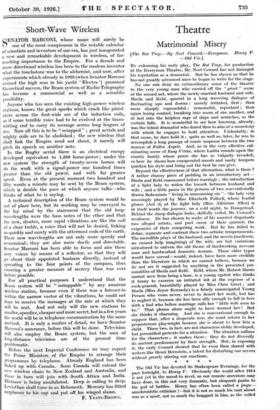Theatre
Matrimonial Misery
[The Rat Trap.—By Noel Coward.—Everyman. henry V.
—Old Vie.] By exhuming his early play, The Rat Trap, for production at the Everyman Theatre, Mr. Noel Coward has not damaged his reputation as a dramatist. • But he has shown its that he has not greatly advanced since he began to write for the stage.
No one can deny an extraordinary sense of the theatre to the very young man who carried off the " great " scene of the second act, where the newly-married husband and wife, Sheila and Keld, quarrel in a long wavering dialogue of fluctuating ups and downs : merely irritated, first ; then more sharply reproachful ; remorseful, repentant ; then again losing control, breaking into scorn of one another, and at last into the helpless rage of slaps and scratches, as the curtain falls. It is wonderful to see how knowing, already, was the infant dramatist who dared thus to aim at a monotony with which he engages to hold attention. Undeniably, in that scene, he does hold it ; quite as well as, later, he, was to accomplish a long passage of comic suspense between the two women of Fallen Angels. And, as in the very effective cul- minating scene of Easy Virtue, where Larita rounds upon the county family whose peace she has so vulgarly invaded, so here he shows how exasperated moods and nasty tempers quicken his style and bring out the best he can give.
Beyond the effectiveness of that altercation, what is there ? A rather clumsy piece of padding in an introductory act— Sheila and Keld enamoured before marriage ; the introduction of a light lady to widen the breach between husband and wife ; and a little pause in the persons of two conventionally drawn Bohemians " living in unassuming sin "—the lady very amusingly played by Miss Elizabeth Pollock, whose fearful glance (Act 8) at the light lady (Miss Adriannc Allen) is in itself worth the journey, on a cold flight, to Hampstead. Behind the sharp dialogue lurks, skilfully veiled, Mr. Coward's weakness. He has chosen to make of hii married disputants two alleged artists, and part cause of their quarrels the exigencies of their competing work. But he has failed to define, separate and contrast these two artistic temperaments. The incredible plays of the husband, and the novels (mediocre, we cannot help imagining) of the wife, are but variations introduced to enliven the old .theme of hardworking nervous man and hardworked domestic woman. Those older types would have served—would, indeed, have been more credible than the literature in which we cannot believe, because we do not see it suggested by anything in the presented per- sonalities of Sheila and Keld. Keld, whom Mr. Robert Harris cannot save from being a bore, is a young egotist who thinks it funny to exercise an irritated wit at the expense of a cook-general, beautifully played by Miss Clare Greet ; and Sheila (Miss Joyce Kennedy) is a falsely emancipated Young Person who vows never, never to desert her work, but has to neglect it, because she has been silly enough to fall in love with a fool who before marriage calls her " little wife soon to be." That phrase alone ought to have warned her I But she thinks it charming. And she is conventional enough to suppose that, after a desperate row, she must return to her preposterous playwright because she is about to bear him a child. These two, in fact, are not characters richly developed, but personified pretexts for a situation. The situation suffices for the characters ; it makes them ; they do not diversify its ancient predicament by their strength. But, in exposing it, the early Coward showed that he even then shared with writers like Henri Bernstein, a talent for disturbing our nerves without greatly stirring our emotions.
* * * *


























































 Previous page
Previous page